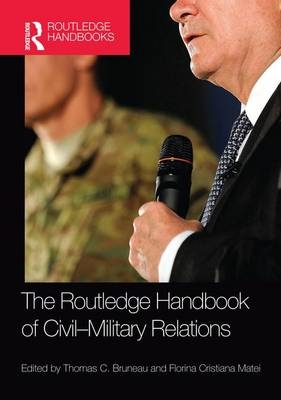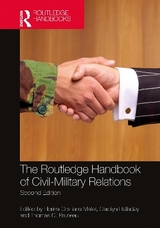
The Routledge Handbook of Civil-Military Relations
Routledge (Verlag)
978-1-138-92269-3 (ISBN)
- Titel erscheint in neuer Auflage
- Artikel merken
The armed forces are central actors in most societies and are involved in many different roles. Amongst other activities, they engage in peace operations, support the police in fighting crime, support civilian authorities in dealing with natural disasters, and fight against terrorists and in internal conflicts. The existing literature on this subject is limited in its discussion of war-fighting and thus does not do justice to this variety of roles.
The Routledge Handbook of Civil–Military Relations not only fills this important lacuna, but offers an up-to-date comparative analysis which identifies three essential components in civil–military relations: (1) democratic civilian control; (2) operational effectiveness; and (3) the efficiency of the security institutions. Amalgamating ideas from key thinkers in the field, the book is organized into three main parts:
Part I: Development of the Field of Study;
Part II: Civil–Military Relations in Non-Democratic or Nominally Democratic Countries;
Part III: Civil–Military Relations in Democratic and Democratizing States: Issues and Institutions.
This new Handbook will be essential reading for students and practitioners in the fields of civil–military relations, defense studies, war and conflict studies, international security and IR in general.
Thomas C. Bruneau is Distinguished Professor of National Security Affairs at the U.S. Naval Postgraduate School, Monterey, California. He has published more than 15 books in English and Portuguese, and recent edited books include, with Lucia Dammert and Elizabeth Skinner, Maras: Gang Violence and Security in Central America (2011) and, with Harold Trinkunas, Global Politics of Defense Reform (2008). Florina Cristiana (Cris) Matei is Lecturer at the Center for Civil–Military Relations (CCMR) at the Naval Postgraduate School.
Introduction, Thomas C. Bruneau and Florina Cristiana Matei Part I: Development of the Field of Study 1. Impediments to the Accurate Conceptualization of Civil-Military Relations, Thomas C. Bruneau 2. Development of an Approach Through Debate, David Pion-Berlin and Thomas C, Bruneau 3. A New Conceptualization of Civil-Military Relations, Florina Cristiana Matei 4. Efficiency in the Use of Resources, Thomas C. Bruneau 5. Security Sector Reform, Timothy Edmunds 6. Escape from Huntington’s Labyrinth: Civil-Military Relations and Comparative Politics, José A. Olmeda Part II: Civil-Military Relations in Non-Democratic or Nominally Democratic Countries 7. Civil-Military Relations in a Dictatorship: North Korea, Jargalsaikhan Mendee 8. Learning from Failure: Egypt, Robert Springborg 9. Lessons not to Learn: Post-Communist Russia, Mikhail Tsypkin 10. The Transformation of the Bolivarian Armed Force: Venezuela, Harold A. Trinkunas 11. Rebuilding the Military Under Democratic Control: Iraq, Abbas Kadhim Part III: Civil-Military Relations in Democratic and Democratising States: Issues and Institutions A. Control: Four Case Studies 12. Asserting Civilian Control: Argentina, Thomas C. Bruneau and Florina Cristiana Matei 13. Civilian Influence in Defense: Slovenia, Florina Cristiana Matei 14. Shifting Lines of Governance in Insurgencies: India, Anshu N. Chatterjee 15. Executive Civilian Control of the Military: Spain, Florina Cristiana Matei and José A. Olmeda B. Effectiveness: Six Case Studies 16. Reforms in Professional Military Education: The United States, Thomas C. Bruneau 17. Discovering Peacekeeping as a New Mission: Mongolia, Thomas C. Bruneau and Jargalsaikhan Mendee 18. The Impact of NATO Membership on Military Effectiveness: Hungary, Florina Cristiana Matei 19. Redefining Defense Strategy: France, Hélène Dieck 20. Building an Integrated Military in Post-Conflict Societies: Lebanon, Anne Marie Baylouny 21. Civil-Military Relations in an Emerging Democracy: South Africa, Jessica Piombo C. Control and Effectiveness: Six Case Studies 22. Developing a Robust Ministry of Defense and a Joint Staff: Portugal, Thomas C. Bruneau 23. Democratic Civilian Control and Military Effectiveness: Chile, Florina Cristiana Matei and Marcos Robledo 24. Achieving Neutrality and Effectiveness: Austria, Donald Abenheim and Carolyn Halladay 25. Stability in Flux: Policy, Strategy, and Institutions in Germany, Donald Abenheim and Carolyn Halladay 26. NATO, the Demand for Democratic Control and Military Effectiveness: Romania, Florina Cristiana Matei 27. The Impact of the Partnership for Peace on Civil-Military Relations: Moldova, Diana Molodilo and Valeriu Mija 28. Conclusion: Lessons Learned and Best Practices, Thomas C. Bruneau and Florina Cristiana Matei
| Erscheint lt. Verlag | 9.6.2015 |
|---|---|
| Zusatzinfo | 15 Tables, black and white; 4 Illustrations, black and white |
| Verlagsort | London |
| Sprache | englisch |
| Maße | 174 x 246 mm |
| Gewicht | 658 g |
| Themenwelt | Geschichte ► Teilgebiete der Geschichte ► Militärgeschichte |
| Sozialwissenschaften ► Politik / Verwaltung ► Staat / Verwaltung | |
| ISBN-10 | 1-138-92269-2 / 1138922692 |
| ISBN-13 | 978-1-138-92269-3 / 9781138922693 |
| Zustand | Neuware |
| Haben Sie eine Frage zum Produkt? |
aus dem Bereich



